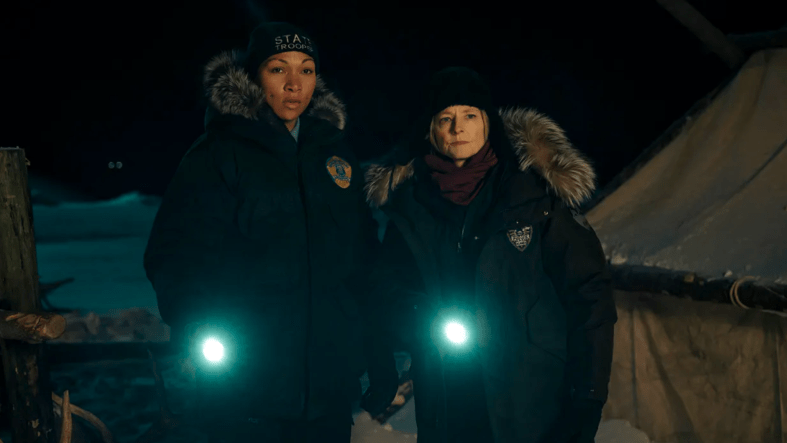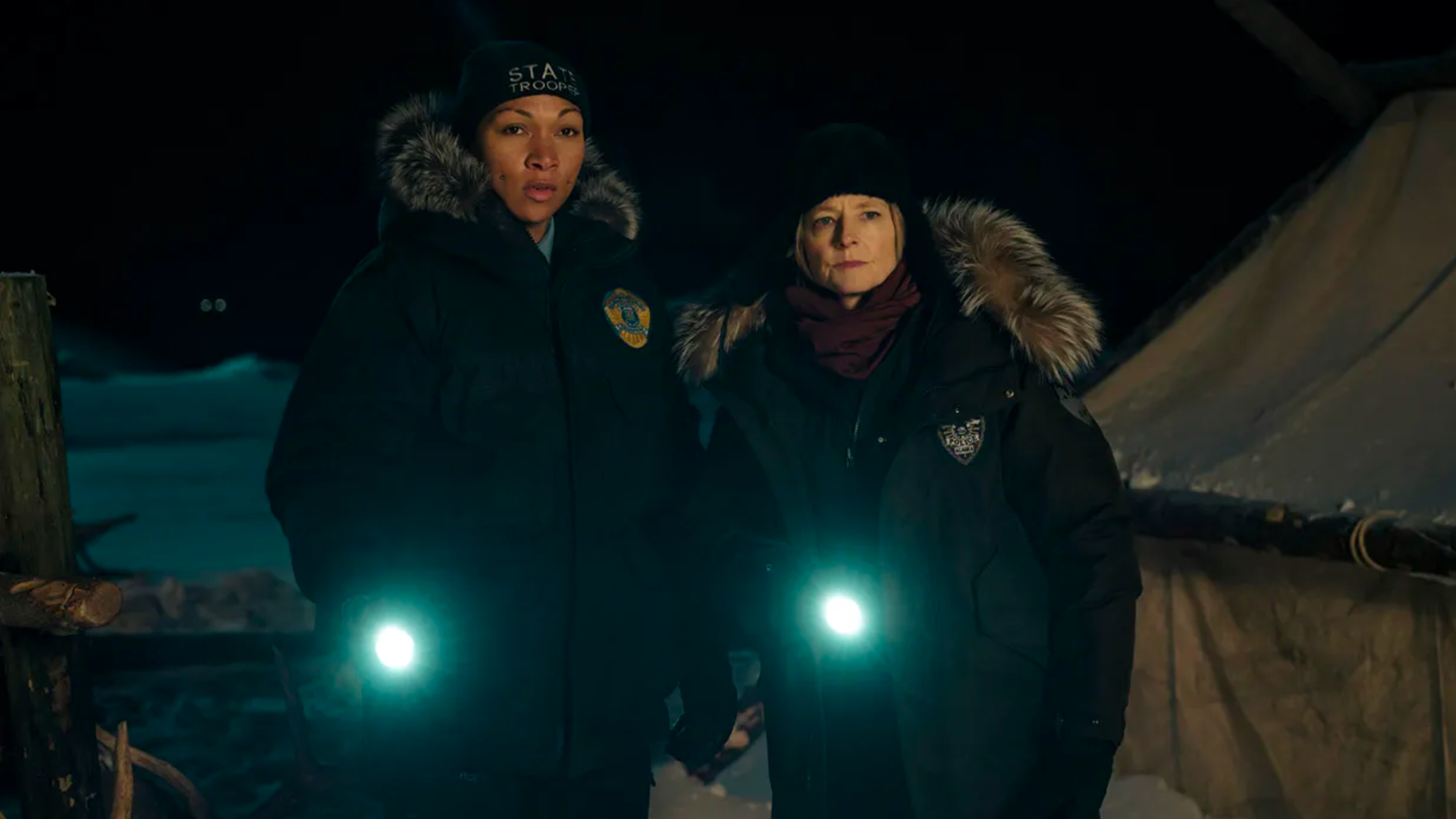Products You May Like

The reason why there are over a thousand episodes of all versions of Law & Order is that audiences love watching the process unfold in bite-sized, hermetically-sealed, less-than-an-hour chunks. Whether it’s the criminal justice system, English manor murder mysteries, or Hugh Laurie naming increasingly obscure illnesses, seeing procedures done by a team of skilled and likable characters is a golden ticket. Combine that with horror mysteries, supernatural culprits, and psychological torment? You’re on your way to the Hall of Fame of Coolest Fiction Ever.
Horror disguised as mystery or detective fiction occupies a very specific space in entertainment. Somewhere between a psychological thriller and a horror mystery, it prioritizes how the process is used to fight something that cannot be demythologized or understood by a rational, logical justice system. True Detective: Night Country just saw critical acclaim—and vocal audience dissent—for confidently straddling this line. With more seasons on the way, we broke down the 10 best horror procedurals to scratch your brain and leave you searching for answers.
True Detective, Season 1 and Night Country
Seasons 1 and 4 of the gritty and searching detective show best qualify as horror. Nic Pizzolatto’s era-defining premier mystery transplants the haunting, madness-inducing voids of Lovecraft into an industrial swampland, where refinery towers loom, multi-pronged and bleeding, over the Louisiana landscape. There’s so much palpable, sweaty fear encased in the 8-episode story as the ritualistic killer is pursued to his home, a place of pure, overwhelming abjection. Issa López’s Night Country, a softish reboot away from Pizzolatto’s management (which he wasn’t thrilled about) doubles down on the supernatural leanings of the first season, with fears of arctic wraiths and permafrost viruses haunting the characters. These two seasons distill the shared DNA between detective fiction and horror.
Evil
Honey, wake up, there’s three seasons of Catholic Church X-Files to watch. The truest procedural on this list, this case-of-the-week series from Robert and Michelle King of The Good Wife fame sets up a forensic psychologist (Katja Herbers) with a Catholic priest-in-training (Mike Colters) to investigate cases of alleged demonic possession. Along the way, they debunk hysteria and confront the possibility that the Devil walks among them, with sparkling chemistry between the two leads. For a network procedural (that moved onto streaming after its first season), Evil has a sure hand on horror craft. There’s a clear, deft understanding of how to unease and creep out a mainstream TV audience. Set to end with its upcoming fourth season, Evil is a reliable and winning series with a unique spin on the format.
Twin Peaks
There would be no True Detective nor Evil without David Lynch and Mark Frost’s seminal TV show, which was curtailed by executive anxieties and features some of the most insane things to be presented to a 90s primetime audience. Ostensibly a charming network soap pastiche, the investigation into the death of prom queen Laura Palmer quickly reveals there’s a demon in the forest, and evil lies just beneath the surface of nearly every character. Experimental in a way that detective shows were not known for, Twin Peaks was a truly collaborative effort to bridge the world of mystery and horror to change the landscape forever.
Se7en
When does a psychological thriller become a horror film? When it’s this bleak, gruesome, and haunting! David Fincher’s descent into the physical and moral cruelty germinating in post-history urban America could not have been made before the 90s, when independent voices were supercharging the studio system with grunge-inflected and subversive stories. So many moments in Se7en are like staring into a depraved abyss of humankind, filled with horror motifs and cues to drive home the violence of what we’re seeing.
Cure
In many ways, the subdued, existential mirror to Se7en’s in-your-face brutality, but Kiyoshi Kurosawa’s Cure is by no means any less effective. Following a Tokyo detective undergoing marital difficulties, Kurosawa guides us through a city harboring a deep distrust and venom for those around us, as a young hypnotist is traced to a series of unrelated grisly murders. The graceful eeriness of Kurosawa’s chiller (a repeating tone throughout his work) catches your breath, as the winding mystery draws us closer to a solution that implicates and disarms all audiences. What if unwinding all your stresses made you more likely to kill?
Angel Dust
This Japanese film was made three years before Cure, and has remained in relative obscurity since. Angel Dust follows a female forensic psychiatrist brought on a serial murder case when a killer targets different subway travelers on a weekly basis, and mirrors Cure’s disorienting vibe and thematic fears of intense urban depersonalization, sometimes even pushing it to more confronting and upsetting. Like Kurosawa with Cure, director Gakuryū Ishii pushes the scant mystery plotting towards a resolution that doesn’t satisfy fans of clean crime narratives, but opens a deeper psychological and philosophical wound in the minds of the audience.
The Wailing
This Korean rural horror from director Na Hong-jin starts as a measured, patient crime movie blended with grisly violence and the promise of something dark lurking around the corner – at least for about an hour. It then nosedives into sensory overload, blending shamanic rituals with parental desperation, like if Denis Villeneuve’s Prisoners became a haunting movie halfway through. As our protagonist, a bumbling local cop (Kwak Do-won) faces a disturbed reality of ghosts, exorcists, and agents of the Devil, Na Hong-jin’s perspective on modernity’s failure to control a remote and ancient evil grips you tighter.
The Silence of the Lambs
When Jonathan Demme’s defining Hannibal Lecter adaptation gets referred to as the only horror film to win Best Picture, a lot of diehard genre fans get sniffy about how restrained and psychological its thrills are—as if this is the only acceptable form for horror to be acknowledged by the Academy’s top honor. Still, there’s no shirking the fact that The Silence of the Lambs is terrifying, blending its prestige procedural movements with a ready embrace of depraved humanity. The ingrained transphobia of its serial killer villain was clear in 1991 to trans viewers, and is only more blatant now – but as an urtext of the horror procedural, Demme’s influence can be seen today. (Night Country even borrowed Clarice for its lead…)
The Exorcist III
A beleaguered police lieutenant trying to stop a barbaric string of murders realizes that the Georgetown exorcism case a priest was killed some years before has everything to do with catching his killer. That’s right, Kinderman, the hit character from The Exorcist, is BACK, as is writer William Peter Blatty’s uncanny blend of warm humanity, eerie psychological confrontation, and bizarre terror. The theatrical ending may have been complicated by studio execs (it’s still better than the director’s cut), but watching George C. Scott plow his way through bureaucratic and satanic obstacles makes for a thoroughly unique take on the possession genre.
The Empty Man
There hasn’t really been a studio horror movie like The Empty Man on this side of the new millennium. David Prior’s occult horror film, packing no real stars and a daunting 139-minute runtime, was mishandled thanks to the intersection of the Disney-Fox acquisition and the pandemic, and had to build a deserved cult status after it dropped on streaming. Following a burnt-out former cop’s investigation into an urban legend with gruesome consequences, Prior’s adaptation of the comic book series of the same name shows an enthusiastic understanding of the allure of cults and spiritual horror, with some impeccably crafted scares and a jaw-dropping resolution to the central, unanswerable mystery.
Categorized:Editorials

